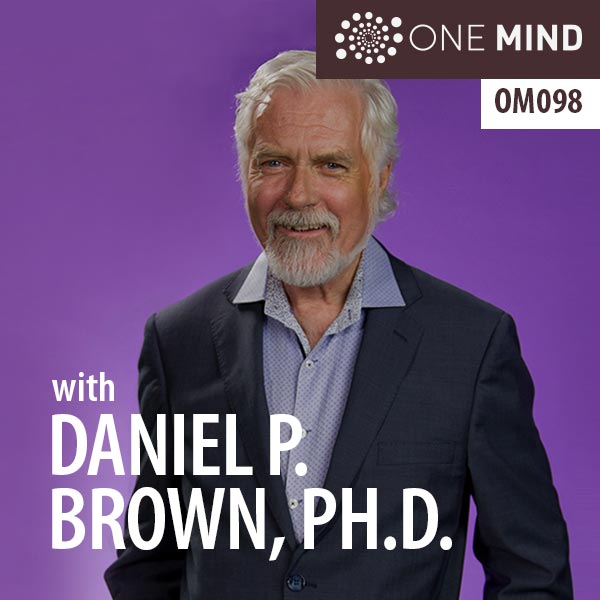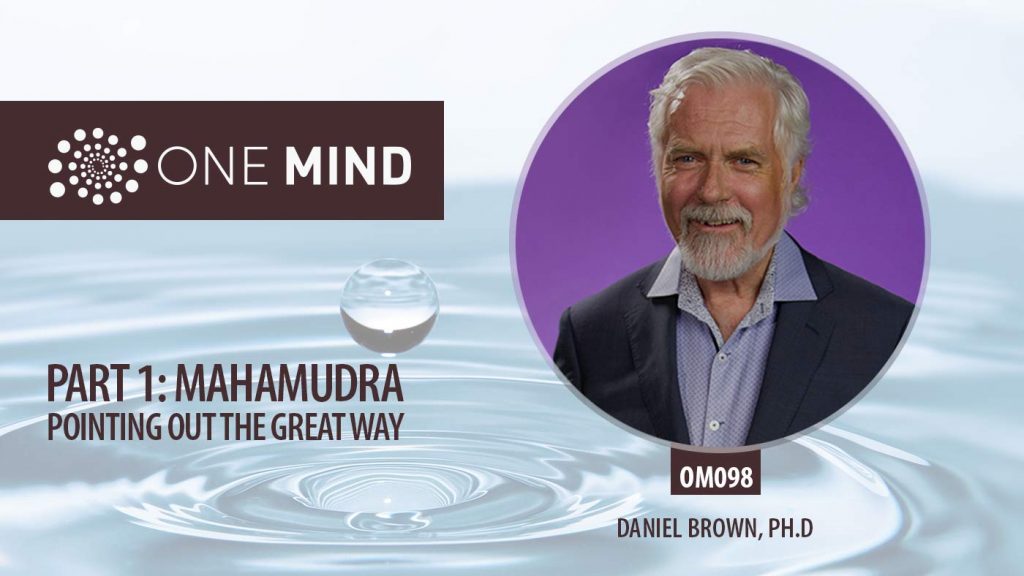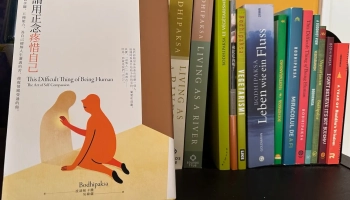
[ad_1]
 In this first part of my interview with Daniel P. Brown, we explore the first stage of training in Mahamudra Pointing Out The Great Way called the Elephant Path of concentration, meditation, and peak performance.
In this first part of my interview with Daniel P. Brown, we explore the first stage of training in Mahamudra Pointing Out The Great Way called the Elephant Path of concentration, meditation, and peak performance.
In part 2, we explore the second stage of training in Mahamudra Pointing Out The Great Way.
Special Offer for One Mind Listeners:
Also, Dan Brown is making his peak performance meditation and concentration self-paced online course available to One Mind Listeners a special 25% discount. Your purchase will also support the production of this podcast.
Use the promo code ABOUTAPRIL20 at checkout to receive the special discount during the month of April.
>> Special Discount For Dan Brown’s Online Concentration and Meditation Peak Performance Training
Short Bio
Dan is an Associate Clinical Professor at Harvard Medical School, a world-renowned Forensic Law & Western psychology expert as well as a Senior Meditation Master in Indo-Tibetan Bon & Buddhism.
Dan has gained more than 50 years of research by synthesizing Western psychotherapy and positive psychology with Eastern contemplative traditions.
Long Bio
Dr. Brown received his undergraduate degree at the University of Massachusetts, Amherst MA in molecular biology and his Ph.D. in Religion & Psychological Studies at the University of Chicago. He received a Danforth Fellowship given for promise in teaching excellence, and as part of that fellowship received specialized training in how to teach. While in graduate school he was particularly interested in interdisciplinary studies. At the University of Chicago he worked in religion & psychological studies, the history of religions, anthropology, human development and clinical psychology. Erika Fromm, Ph.D. a noted hypnoanalyst, served as his primary clinical mentor–a relationship that spanned 35 years. Dr. Brown has taught hypnotherapy for 38 years. His books on hypnosis include a standard textbook on clinical hypnosis, Hypnotherapy and Hypnoanalysis (with E. Fromm), Hypnosis and Behavioral Medicine (with E. Fromm), and Creative Mastery in Hypnosis and Hypnoanalysis, on the permissive style of hypnotherapy. While in graduate school in Chicago he commuted to the University of Wisconsin, Madison for part time studies in the Buddhist studies program, where he learned Tibetan, Buddhist Sanskrit, and Pali.
His first clinical placement as a psychological clerk was at Michael Reese Hospital in Chicago where he studied thought disorder in schizophrenics with Martin Harrow and self psychology with Heinz Kohut. He also commuted part time to The Menninger Foundation in Topeka Kansas where he did work with the staff of the children and adolescent units on the treatment of substance abuse. There, Karl Menninger, M.D. served as an important mentor. In the late 1970s he moved back to his home state of Massachusetts where he did a clinical internship at McLean Hospital and a Post-Doctoral Fellowship in Clinical Research at Harvard Medical School at The Cambridge Hospital. His research focused on the long-term effects of mindfulness meditation.
In the 1980s Dr. Brown served as Director of Training and then as Chief Psychologist at The Cambridge Hospital. There, he helped develop and gain accreditation for an APA-approved clinical psychology internship and post-doctoral training program. His vision was to provide the best young talent in psychology the opportunity to work with a disenfranchised inner city chronic mental health population, which included intensive developmentally-informed psychotherapy for patients with major mental illness and complex trauma disorders. His program included intensive multicultural and bilingual mental health training. At the Cambridge Hospital he developed and directed the Behavioral Medicine Program, a joint venture between psychiatry and primary care medicine. His book Hypnosis and Behavioral Medicine represents the clinical approaches developed in that program. Drawing upon his undergraduate background in molecular biology and immunology he developed a special interest in psychoneuroimmunology and the psychosocial treatment of immune disorders. He developed a joint exchange between the Beijing College of Traditional Chinese Medicine and The Cambridge Hospital for dissemination of research findings on approaches to treating immune-related disorders in TCM and behavioral medicine.
Since 1990 Dr. Brown has devoted much of his time to clinical teaching. He has taught in the Division of Continuing Education of Harvard Medical School at Massachusetts Mental Health Center/Beth Israel-Deaconnes Medical Center. There he teaches seminars on hypnosis, trauma, treatment of attachment pathology, and peak performance. Since 1990 he has taught a course on Performance Excellence, one version for primary care doctors and surgeons, one version for judges, and one version for business executives. Currently, Dr. Brown is an Associate Clinical Professor in Psychology at Harvard Medical School. He has served on the Harvard Medical School faculty for 37 years. Dr. Brown also directs his own private continuing education organization wherein he teaches a wide variety of seminars in the mental health field locally, nationally, and internationally. He tries to stay abreast of the latest scientific development in assessment and treatment in mental health and translate these findings into clinical teaching to offer clinicians practical, state-of-the-art clinical methods and as way of continuously upgrade their standard of care. He is the senior author of a major textbook on the treatment of attachment disorders in adults, D Brown & D Elliott, Attachment Disturbances in Adults.
In the late 1970s Dr. Brown became interested in the study of trauma and abuse largely through peer collaboration with Sarah Haley, one of the founding members of the International Society for the Study of Traumatic Stress. Most of his clinical writing and teaching from the 1980s and 1990s focuses on refining phase-oriented treatment for complex trauma disorders. In the 1980s Dr. Brown began to study the development of the psychological sense of self and emotional development. He has written two books on developmental psychopathology–a book on affect development, Human Feelings, and a book on self development from a cross cultural perspective, Transformations of Consciousness.His main interest was in developing detailed developmentally-informed treatment protocols for treating self pathology and affect dysregulation in patients. In the 2000s Dr. Brown began to study adult attachment and received intensive training in the Adult Attachment Interview. His more recent research focuses on the relative contribution of early attachment pathology to the development of personality and dissociative disorders in adulthood. His current orphanage study delineates the differential contribution of early attachment pathology and later childhood abuse to adult psychopathology. Dr. Brown has been developing a step-wise treatment protocol for the treatment of adult attachment pathology in personality and dissociative disorder patients and is collecting outcome data on this new treatment approach.
In the early 1990s Dr. Brown became interested in the topic of memory for trauma and abuse. His textbook, Memory, Trauma Treatment and the Law is the recipient of awards from 7 professional societies, including the 1999 Manfred S. Guttmacher Award given jointly by the American Psychiatric Association and the American Academy of Psychiatry and Law for the “outstanding contribution to forensic psychiatry.” He was invited to write the chapter on the current standard of forensic psychological testing for the current textbook on forensic psychiatry published by the American Psychiatric Association. He has served as an expert witness in the courts in over two hundred lawsuits: psychological damages from trauma and abuse; memory for trauma; reliability of childrens’ reports of abuse; and evaluating claims of suggestive psychotherapy interviews, abuse investigative interviews, and police interrogations. His work as an expert witness or consultant on trauma and memory has included testimony before of International War Crimes Tribunal for the Prosecution of war criminals of the former Yugoslavia. His testimony, upheld on appeal, helped establish the standard of evidence for evaluating the reliability of memory for severe war atrocities. His testimony also contributed to three state supreme court cases on the reliability of children’s testimony regarding sexual abuse.
Dr. Brown studied meditation practice for 47 years, including Patanjali’s Yogasutras and its commentaries in the original Sanskrit with the great historian of religion, Mircea Eliade and as a direct meditation practice with Dr. Arwind Vasavada. He studied Burmese mindfulness meditation in Burma with its originator, Mahasi Sayadaw and other masters like Tungpalu Sayadaw and Acchan Cha. He studied Indo-Tibetan concentration and insight meditation with the root teacher, Geshe Wangyal, and then with Denmo Loncho Rinpoche and Yeshe Tapgyay, and learned Mahamudra meditation from numerous Tibetan lamas. He spent 46 years translating meditation texts from Tibetan and Sanskrit . As a Western psychologist he spent 10 years conducting outcomes research on beginning and advanced meditators, with an emphasis on researching the effects of intensive concentration meditation and on the nature of the awakened mind. He has taught intensive meditation retreats internationally for 32 years, alone and in collaboration with a number of Tibetan meditation masters. His recent interest is in meditations designed to stabilize awakening in everyday life and to bring about the flourishing of positive qualities of mind, such as the Great Completion (Dzogschen) meditations. He is the author of 4 books on meditation including Transformations of Consciousness and Pointing Out the Great Way. He translated the Pith Instructions on the A Khrid rDzogs Chen
[Great Completion]
meditation, and an extensive collection of the most advanced cave and hermitage yogi practices, The Self-Arising Three-fold Embodiment of Enlightenment. Dr. Brown’s background in both Western psychology and Eastern meditation traditions offers a unique integration of the contemporary Western research on peak performance and positive psychology and the classical Buddhist meditation lineage traditions. He has the only scientific study identifying the neurocircuitry of the meditative experience of awakened mind.
[ad_2]
Source link






